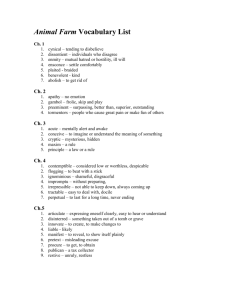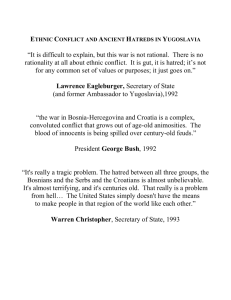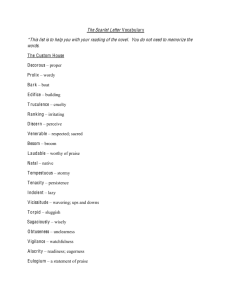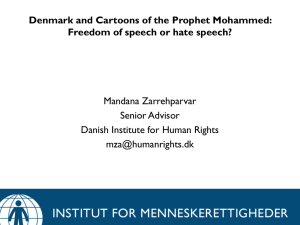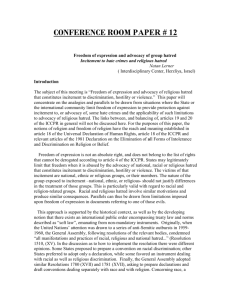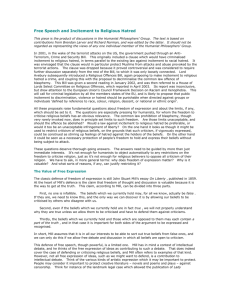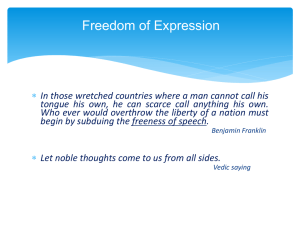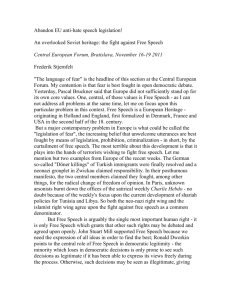Rabat Plan of Action on the prohibition of advocacy of national
advertisement
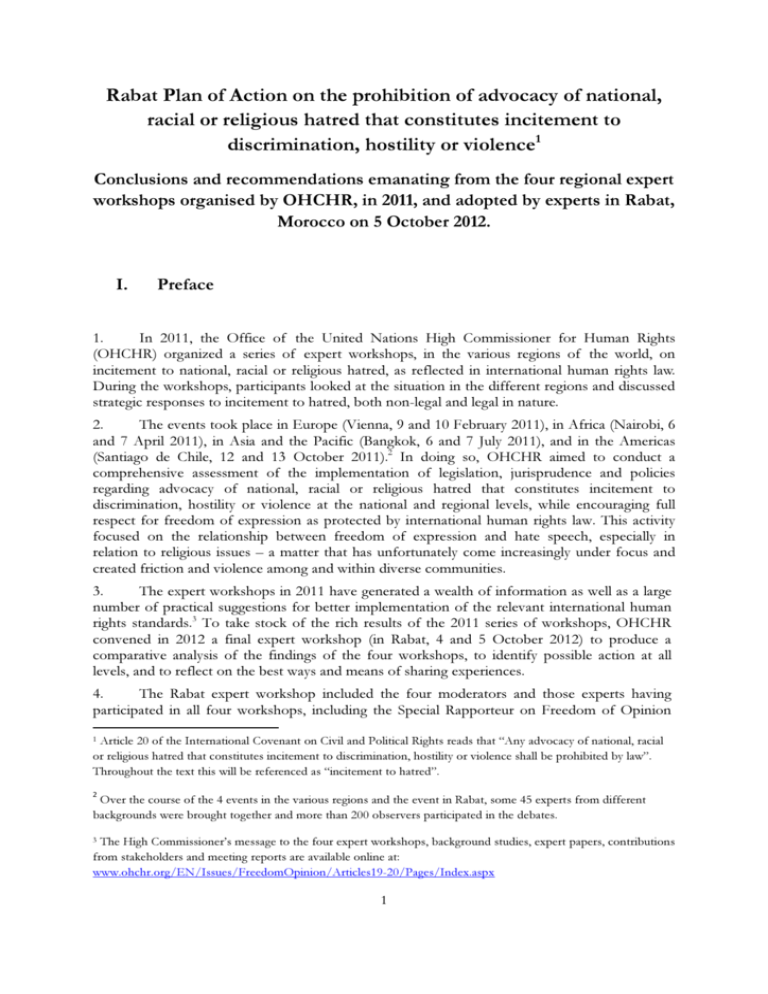
Rabat Plan of Action on the prohibition of advocacy of national, racial or religious hatred that constitutes incitement to discrimination, hostility or violence1 Conclusions and recommendations emanating from the four regional expert workshops organised by OHCHR, in 2011, and adopted by experts in Rabat, Morocco on 5 October 2012. I. Preface 1. In 2011, the Office of the United Nations High Commissioner for Human Rights (OHCHR) organized a series of expert workshops, in the various regions of the world, on incitement to national, racial or religious hatred, as reflected in international human rights law. During the workshops, participants looked at the situation in the different regions and discussed strategic responses to incitement to hatred, both non-legal and legal in nature. 2. The events took place in Europe (Vienna, 9 and 10 February 2011), in Africa (Nairobi, 6 and 7 April 2011), in Asia and the Pacific (Bangkok, 6 and 7 July 2011), and in the Americas (Santiago de Chile, 12 and 13 October 2011).2 In doing so, OHCHR aimed to conduct a comprehensive assessment of the implementation of legislation, jurisprudence and policies regarding advocacy of national, racial or religious hatred that constitutes incitement to discrimination, hostility or violence at the national and regional levels, while encouraging full respect for freedom of expression as protected by international human rights law. This activity focused on the relationship between freedom of expression and hate speech, especially in relation to religious issues – a matter that has unfortunately come increasingly under focus and created friction and violence among and within diverse communities. 3. The expert workshops in 2011 have generated a wealth of information as well as a large number of practical suggestions for better implementation of the relevant international human rights standards.3 To take stock of the rich results of the 2011 series of workshops, OHCHR convened in 2012 a final expert workshop (in Rabat, 4 and 5 October 2012) to produce a comparative analysis of the findings of the four workshops, to identify possible action at all levels, and to reflect on the best ways and means of sharing experiences. 4. The Rabat expert workshop included the four moderators and those experts having participated in all four workshops, including the Special Rapporteur on Freedom of Opinion 1 Article 20 of the International Covenant on Civil and Political Rights reads that “Any advocacy of national, racial or religious hatred that constitutes incitement to discrimination, hostility or violence shall be prohibited by law”. Throughout the text this will be referenced as “incitement to hatred”. 2 Over the course of the 4 events in the various regions and the event in Rabat, some 45 experts from different backgrounds were brought together and more than 200 observers participated in the debates. The High Commissioner’s message to the four expert workshops, background studies, expert papers, contributions from stakeholders and meeting reports are available online at: www.ohchr.org/EN/Issues/FreedomOpinion/Articles19-20/Pages/Index.aspx 3 1 and Expression, the Special Rapporteur on Freedom of Religion or Belief, and the Special Rapporteur on Racism, Racial Discrimination, Xenophobia and Related Intolerance, a member of the Committee on the Elimination of Racial Discrimination and a representative of the NonGovernmental Organization Article XIX. 5. In line with the practice of the previous workshops, Member States were invited to participate as observers, and were encouraged to include experts from their capitals in the delegations. Relevant UN departments, funds and programmes as well as relevant international and regional organizations, national human rights institutions and civil society organizations (including academia, journalists and faith-based organizations) could also participate as observers. 6. The following outcome document reflects the conclusions and recommendations agreed upon by the experts of the Rabat workshop either took part in all of the four workshops or who moderated one of these. II. Context 7. As the world is ever more inter-connected and as the fabric of societies has become more multicultural in nature, there have been a number of incidents in recent years, in different parts of the world, which have brought renewed attention to the issue of incitement to hatred. It should, however, be underlined that many of the world’s conflicts in past decades have also – to varying degrees – contained a component of incitement to national, racial or religious hatred. 8. All human rights are universal, indivisible and interdependent and interrelated. Nowhere is this interdependence more obvious than in the discussion of freedom of expression in relation to other human rights. The realisation of the right to freedom of expression enables vibrant, multi-faceted public interest debate giving voice to different perspectives and viewpoints. Respect for freedom of expression has a crucial role to play in ensuring democracy and sustainable human development, as well as in promoting international peace and security. 9. However, individuals and groups have unfortunately suffered, e.g. for reason of their ethnicity or religion, from various forms of discrimination, hostility or violence. One particular challenge in this regard is to contain the negative effects of a manipulation of race, ethnic origin and religion and to guard against the adverse use of concepts of national unity or national identity, which are often instrumentalised including for political and electoral purposes. 10. It is often purported that freedom of expression and freedom of religion or belief are in a tense relationship or can even be contradictory. Instead they are mutually dependent and reinforcing. The freedom to exercise or not one's religion or belief cannot exist if the freedom of expression is not respected as free public discourse depends on respect for the diversity of deep convictions which people may have. Likewise, freedom of expression is essential to creating an environment in which a constructive discussion about religious matters could be held. Indeed, free and critical thinking in open debate is the soundest way to probe whether religious interpretations adhere to, or rather distort the original values that underpin religious belief. 11. It is of concern that incidents, which indeed reach the threshold of article 20 of the International Covenant on Civil and Political Rights (ICCPR), are not prosecuted and punished. At the same time members of minorities are de facto persecuted, with a chilling effect on others, through the abuse of vague domestic legislation, jurisprudence and policies. This dichotomy of (1) no prosecution of “real” incitement cases and (2) persecution of minorities under the guise of domestic incitement laws seems to be pervasive. Anti-incitement laws in countries across the world can be 2 qualified as heterogeneous, at times excessively narrow or vague; jurisprudence on incitement to hatred has been scarce and ad hoc; and while several States have adopted related policies, most of them too general, not systematically followed up, lacking focus and deprived of proper impact-assessments. 12. The holding of the four workshops in all regions of the world and the wrap-up workshop in Rabat, which enjoyed the full participation of relevant treaty body experts and special procedures mandate holders, are therefore constitute a very timely and useful initiative. III. Implementing the prohibition of incitement to hatred 13. Against this background, the following conclusions and recommendations constitute the synthesis of this long, transparent and deep reflection by experts. These conclusions – in the area of legislation, judicial infrastructure, and policy – aim to better guide all stakeholders in implementing the international prohibition of any advocacy of national, racial or religious hatred that constitutes incitement to discrimination, hostility or violence. A. Legislation Conclusions 14. Under international human rights standards, which are to guide legislation at the national level, expression labelled as “hate speech” can be restricted under articles 18 and 19 of the ICCPR on different grounds, including respect for the rights of others, public order, or even sometimes national security. States are also obliged to “prohibit” expression that amounts to “incitement” to discrimination, hostility or violence (under article 20.2 of the ICCPR and, under some different conditions, also under article 4 of the ICERD). 15. Discussions in the various workshops demonstrated the absence of the legal prohibition of incitement to hatred in many domestic legal frameworks around the world. Moreover, legislation that prohibits incitement to hatred uses variable terminology and is often inconsistent with article 20 of the ICCPR. The broader the definition of incitement to hatred is in domestic legislation, the more it opens the door for arbitrary application of these laws. The terminology relating to offences on incitement to national, racial or religious hatred varies in the different countries and is increasingly rather vague while new categories of restrictions or limitations to freedom of expression are being incorporated in national legislation. This contributes to the risk of a misinterpretation of article 20 of the ICCPR and an addition of limitations to freedom of expression not contained in article 19 of the ICCPR. 16. Some countries have offences which cover incitement to racial and religious hatred while others cover only racial/ethnic issues. Some countries have also recognized the prohibition of incitement on other grounds. National approaches vary between civil law and criminal law provisions. In many countries, incitement to hatred gives rise to criminal offence(s); in some countries, it relates to both criminal and civil law or only civil law. 17. At the international level, the prohibition of incitement to hatred is clearly established in article 20 ICCPR and article 4 ICERD. In its General Comment 34, the Human Rights Committee stresses that “[p]rohibitions of displays of lack of respect for a religion or other belief system, including blasphemy laws, are incompatible with the Covenant, except in the specific 3 circumstances envisaged in article 20, paragraph 2, of the Covenant. Such prohibitions must also comply with the strict requirements of article 19, paragraph 3, as well as such articles as 2, 5, 17, 18 and 26 of the ICCPR. Thus, for instance, it would be impermissible for any such laws to discriminate in favour of or against one or certain religions or belief systems, or their adherents over another, or religious believers over non-believers. Nor would it be permissible for such prohibitions to be used to prevent or punish criticism of religious leaders or commentary on religious doctrine and tenets of faith.” 18. Article 20 ICCPR requires a high threshold because, as a matter of fundamental principle, limitation of speech must remain an exception. Such a threshold needs to be read in consonance with article 19 of the ICCPR. Indeed the three part test for restrictions (legality, proportionality and necessity) also applies to incitement cases, i.e. such restrictions must be provided by law, be narrowly defined to serve a legitimate interest, and be necessary in a democratic society to protect that interest. This implies, among other things, that restrictions: are clearly and narrowly defined and respond to a pressing social need; are the least intrusive measures available; are not overly broad, in that they do not restrict speech in a wide or untargeted way; and are proportionate in the sense that the benefit to the protected interest outweighs the harm to freedom of expression, including in respect to the sanctions they authorise. 19. At the national level, blasphemy laws are counter-productive, since they may result in the de facto censure of all inter-religious/belief and intra-religious/belief dialogue, debate, and also criticism, most of which could be constructive, healthy and needed. In addition, many of these blasphemy laws afford different levels of protection to different religions and have often proved to be applied in a discriminatory manner. There are numerous examples of persecution of religious minorities or dissenters, but also of atheists and non-theists, as a result of legislation on religious offences or overzealous application of various laws that use a neutral language. Moreover, the right to freedom of religion or belief, as enshrined in relevant international legal standards, does not include the right to have a religion or a belief that is free from criticism or ridicule. Recommendations • In terms of general principles, a clear distinction should be made between three types of expression: expression that constitutes a criminal offence; expression that is not criminally punishable but may justify a civil suit or administrative sanctions; expression that does not give rise to criminal, civil or administrative sanctions but still raises a concern in terms of tolerance, civility and respect for the rights of others. • States should ensure that, bearing in mind the interrelationship between articles 19 and 20 of the ICCPR, the domestic legal framework on incitement should be guided by express reference to article 20 of the ICCPR (“advocacy of national, racial or religious hatred that constitutes incitement to discrimination, hostility or violence”) and should consider including robust definitions of key terms like hatred, discrimination, violence, hostility, etc. In this regard, legislation can draw, inter alia, from the guidance and definitions provided in the Camden Principles on Freedom of Expression and Equality (Camden Principles).45 4 Pursuant to its Principle 12, national legal systems should make it clear, either explicitly or through authoritative interpretation, that the terms hatred and hostility refer to “intense and irrational emotions of opprobrium, enmity and detestation towards the target group”, that the 4 B. • States should ensure that the three part test for restrictions of freedom of expression – legality, proportionality and necessity – also applies to cases of incitement to hatred. • States should make use of the guidance provided by the international human rights expert mechanisms, including the Human Rights Committee and the Committee on the Elimination on Racial Discrimination (CERD) and their respective General Comment 34 and General Recommendation 15 as well as the respective special procedures mandate holders of the Human Rights Council. • States are encouraged to ratify and effectively implement the relevant international and regional human rights instruments, remove any reservations thereto, and honour their reporting obligations thereunder. • States that have blasphemy laws should repeal these as such laws have a stifling impact on the enjoyment of freedom of religion or belief and healthy dialogue and debate about religion. • States should adopt comprehensive anti-discrimination legislation that includes preventive and punitive action to effectively combat incitement to hatred. Jurisprudence Conclusions 20. An independent judicial infrastructure, regularly updated about international standards and jurisprudence, and with its members acting in an impartial and objective manner, and respect for the rules of due process, is crucial for ensuring that the facts and legal qualifications of any individual case are assessed consistent with international human rights standards. This should be complemented by other checks and balances to protect human rights such as independent national human rights institutions established in accordance with the Paris Principles. 21. There is often a very low recourse to judicial and quasi-judicial mechanisms in alleged cases of incitement to hatred. In many instances, victims are from disadvantaged or vulnerable groups. Throughout the world, case law on the prohibition of incitement to hatred is not readily available. This can be explained by, in some instances, the absence of legislation, of adequate legislation or judicial assistance to minorities and other vulnerable groups who constitute the majority of victims of incitement to hatred. The weak jurisprudence can also be explained by the absence of accessible archives but also by the mere lack of recourse to courts owing to limited awareness among the general public as well as a lack of trust in the judiciary. term advocacy is to be understood as “requiring an intention to promote hatred publicly towards the target group” and that the term incitement refers to “statements about national, racial or religious groups which create an imminent risk of discrimination, hostility or violence against persons belonging to those groups”. 5 These Principles were prepared by ARTICLE 19 on the basis of multi-stakeholder discussions involving experts in international human rights law on freedom of expression and equality issues. The Principles represent a progressive interpretation of international law and standards, accepted State practice (as reflected, inter alia, in national laws and the judgments of national courts), and the general principles of law recognised by the community of nations. 5 22. It was suggested to have a high threshold for defining limitations on freedom of expression, for defining incitement to hatred, and for the application of article 20 of the ICCPR. To establish severity as the underlying consideration behind the thresholds, the incitement to hatred must refer to the most severe and deeply felt form of opprobrium. To assess the severity of the hatred, possible issues may include the cruelty of what is said or of the harm advocated and the frequency, amount and extent of the communications. In this regard, a six part threshold test was proposed for those expressions which are criminally prohibited: • • • • • • Context: Context is of great importance when assessing whether particular statements are likely to incite to discrimination, hostility or violence against the target group and it may have a bearing directly on both intent and/or causation. Analysis of the context should place the speech act within the social and political context prevalent at the time the speech was made and disseminated Speaker: The position or status of the speaker in the society should be considered, specifically the individual’s or organisation’s standing in the context of the audience to whom the speech is directed. Intent: Article 20 of the ICCPR requires intent. Negligence and recklessness are not sufficient for an article 20 situation which requires “advocacy” and “incitement” rather than mere distribution or circulation. In this regard, it requires the activation of a triangular relationship between the object and subject of the speech as well as the audience. Content or form: The content of the speech constitutes one of the key foci of the court’s deliberations and is a critical element of incitement. Content analysis may include the degree to which the speech was provocative and direct, as well as a focus on the form, style, nature of the arguments deployed in the speech at issue or in the balance struck between arguments deployed, etc Extent of the speech: This includes elements such as the reach of the speech, its public nature, magnitude and the size of its audience. Further elements are whether the speech is public, what the means of dissemination are, considering whether the speech was disseminated through one single leaflet or through broadcasting in the mainstream media or internet, what was the frequency, the amount and the extent of the communications, whether the audience had the means to act on the incitement, whether the statement (or work of art) was circulated in a restricted environment or widely accessible to the general public. Likelihood, including imminence: Incitement, by definition, is an inchoate crime. The action advocated through incitement speech does not have to be committed for that speech to amount to a crime. Nevertheless some degree of risk of resulting harm must be identified. It means the courts will have to determine that there was a reasonable probability that the speech would succeed in inciting actual action against the target group, recognising that such causation should be rather direct Recommendations • • National and regional courts should be regularly updated on international standards and international, regional and comparative jurisprudence regarding incitement to hatred because when confronted with such cases, courts need to undertake thorough analysis based on a well thought through threshold test. States should ensure the right to a fair and public hearing by a competent, independent and impartial tribunal established by law. 6 • • • C. Due attention should be given to minorities and vulnerable groups by providing legal and other types of assistance for their members. States should ensure that persons who have suffered actual damage as a result of incitement to hatred have a right to an effective remedy, including a civil or non-judicial remedy for damages. Criminal sanctions related to unlawful forms of expression should be seen as last resort measures to be only applied in strictly justifiable situations. Civil sanctions and remedies should also be considered, including pecuniary and non-pecuniary damages, along with the right of correction and the right of reply. Administrative sanctions and remedies should also be considered, including those identified and put in force by various professional and regulatory bodies. Policies Conclusions 23. While a legal response remains important, legislation is only part of a larger toolbox to respond to the challenges of hate speech. Any related legislation should be complemented by initiatives coming from various sectors of society geared towards a plurality of policies, practices and measures nurturing social consciousness, tolerance and understanding change and public discussion. This is with a view to creating and strengthening a culture of peace, tolerance and mutual respect among individuals, public officials and members of the judiciary as well as rendering media organizations and religious/community leaders more ethically aware and socially responsible. States, media and society have a collective responsibility to ensure that acts of incitement to hatred are spoken out against and acted upon with the appropriate measures in accordance with international human rights law. 24. Political and religious leaders should refrain from using messages of intolerance or expressions which may incite to violence, hostility or discrimination but also have a crucial role to play in speaking out firmly and promptly against intolerance, discriminatory stereotyping and instances of hate speech. It should be made clear that violence can never be tolerated as a response to incitement to hatred. 25. To tackle the root causes of intolerance, a much broader set of policy measures is necessary, for example in the areas of intercultural dialogue – reciprocal knowledge and interaction – or education for pluralism and diversity, and policies empowering minorities and Indigenous People to exercise their right to freedom of expression. 26. States have the responsibility to ensure space for minorities to enjoy their fundamental rights and freedoms, for instance by facilitating registration and functioning of minority media organisations. States should strengthen the capacities of communities to access and express a range of views and information and embrace the healthy dialogue and debate that it can encompass. 27. Certain regions have had a marked preference for a non-legislative approach to combating incitement to hatred through in particular the adoption of public policies and the establishment of various types of institutions and processes, including truth and reconciliation commissions. The important work of regional human rights mechanisms, specialised bodies, a vibrant civil society, and independent monitoring institutions is fundamentally important in all regions of the 7 world. In addition, positive traditional values, compatible with internationally recognised human rights norms and standards, can also contribute towards countering incitement to hatred. 28. The importance of the media and other means of public communication in enabling free expression and the realisation of equality is fundamental. The traditional media continue to play an important role globally, but they are undergoing significant transformation. New technologies — including digital broadcasting, mobile telephony, the Internet and social networks — vastly enhance the dissemination of information and open up new forms of communication, such as the blogosphere. 29. Steps taken by the United Nations Human Rights Council, in particular the adoption without a vote of its resolution 16/18 on “Combating intolerance, negative stereotyping and stigmatization of, and discrimination, incitement to violence, and violence against persons based on religion or belief” constitutes a promising platform for effective, integrated and inclusive action by the international community. This resolution requires implementation and constant follow-up by States at the national level, including through the “Rabat Plan of Action” which contributes to its fulfilment. Recommendations to States • States should enhance their engagement in broad efforts to combat negative stereotypes of, and discrimination against, individuals and communities on the basis of their nationality, ethnicity, religion or belief. • States should promote intercultural understanding, including on gender sensitivity. In this regard, all States have the responsibility to build a culture of peace and a duty to put an end to impunity. • States should promote and provide teacher training on human rights values and principles by introducing or strengthening intercultural understanding as a part of the school curriculum for pupils of all ages. • States should raise the capacity to train and sensitise the security forces, law-enforcement agents and those involved in the administration of justice regarding questions concerning the prohibition of incitement to hatred. • States should consider creating equality bodies, or enhance this function within national human rights institutions (established in accordance with the Paris Principles), with enlarged competencies in the field of fostering social dialogue but also in relation to accepting complaints about incidents of incitement to hatred. To render such functions efficient also new adapted guidelines, tests and good practices are needed in order to avoid arbitrary practices and improve international coherence. • States should ensure the necessary mechanisms and institutions in order to guarantee the systematic collection of data in relation to incitement to hatred offences. • States should have in place a public policy and regulatory framework which promotes pluralism and diversity of the media, including new media; and which promotes universal and non-discrimination in access to and use of means of communication. • States should strengthen international human rights mechanisms, particularly the human rights treaty bodies such as the Human Rights Committee and CERD as well as the Special Procedures Mandate Holders, as they advise and support States’ national policies to implement human rights law. 8 Recommendations to the United Nations • The Office of the High Commissioner for Human Rights should be properly resourced to adequately support the international expert mechanisms working on the protection of freedom of expression, freedom of religion, preventing incitement to hatred, preventing discrimination and related topics. In this regard, States should support the efforts of the High Commissioner for Human Rights with a view to strengthening the human rights treaty bodies as well as ensuring the provision of adequate resources for the special procedures mechanisms. • The Office of the High Commissioner for Human Rights is invited to work together with States that wish to avail themselves of its services in order to enhance their domestic normative and policy framework regarding the prohibition of incitement to hatred. In this regard, OHCHR may consider – inspired by the 4 regional workshops as part of this process – developing tools, including a compilation of best practices and elements of a model legislation with regard to the prohibition of incitement to hatred as reflected in international human rights law. OHCHR may also consider organising regular judicial colloquia in order to update national judicial authorities and stimulate the sharing of experiences regarding the prohibition of incitement to hatred which may enrich the progressive development of national legislation and case law on this evolving issue. • Relevant human rights treaty bodies and special procedures mandate holders should enhance their synergies and cooperation, including through joint action, as appropriate, to denounce instances of advocacy of national, racial or religious hatred that constitutes incitement to discrimination, hostility or violence. • Various entities of the United Nations system including the Office of the High Commissioner for Human Rights, the UN Alliance of Civilisations, and the Office of the Special Advisor on the Prevention of Genocide should enhance their cooperation in order to maximise synergies and stimulate joint action • Cooperation and information sharing (a) between various regional and cross-regional mechanisms such as the Council of Europe, the Organisation for Security and Cooperation in Europe, the European Union, the Organisation of American States, the African Union, ASEAN, as well as the Organisation of Islamic Cooperation, and (b) between these organisations and the United Nations Organisation should be further enhanced. • Consider implementing, at the national level, and in cooperation with States measures to realise these recommendations addressed to States. Recommendations to other stakeholders • Non-governmental organisations, national human rights institutions as well as other civil society groups should create and support mechanisms and dialogues to foster intercultural and inter-religious understanding and learning. • Political parties should adopt and enforce ethical guidelines in relation to the conduct of their representatives, particularly with respect to public speech. • Self-regulation, where effective, remains the most appropriate way to address professional issues relating to the media. In line with Principle 9 of the Camden Principles, all media should, as a moral and social responsibility, and through self-regulation, play a role in 9 combating discrimination and in promoting intercultural understanding, including by considering the following: − Taking care to report in context and in a factual and sensitive manner, while ensuring that acts of discrimination are brought to the attention of the public. − Being alert to the danger of discrimination or negative stereotypes of individuals and groups being furthered by the media. − Avoiding unnecessary references to race, religion, gender and other group characteristics that may promote intolerance. − Raising awareness of the harm caused by discrimination and negative stereotyping. − Reporting on different groups or communities and giving their members an opportunity to speak and to be heard in a way that promotes a better understanding of them, while at the same time reflecting the perspectives of those groups or communities. 30. Furthermore, voluntary professional codes of conduct for the media and journalists should reflect equality principles and effective steps should be taken to promulgate and implement such codes. IV. Concluding comment 31. While the concept of freedom of expression has received systematic attention in international human rights law and in many national legislations, its practical application and recognition is not fully respected all around the world. At the same time, international human rights standards on the prohibition of incitement to national, racial or religious hatred still need to be integrated in domestic legislation and policies in many parts of the world. This explains both the objective difficulty and political sensitivity of defining this concept in a manner that respects the freedom of expression. 32. The preceding conclusions and recommendations are steps towards addressing these challenges which it is hoped will boost both the national efforts and international cooperation in this area. 10
